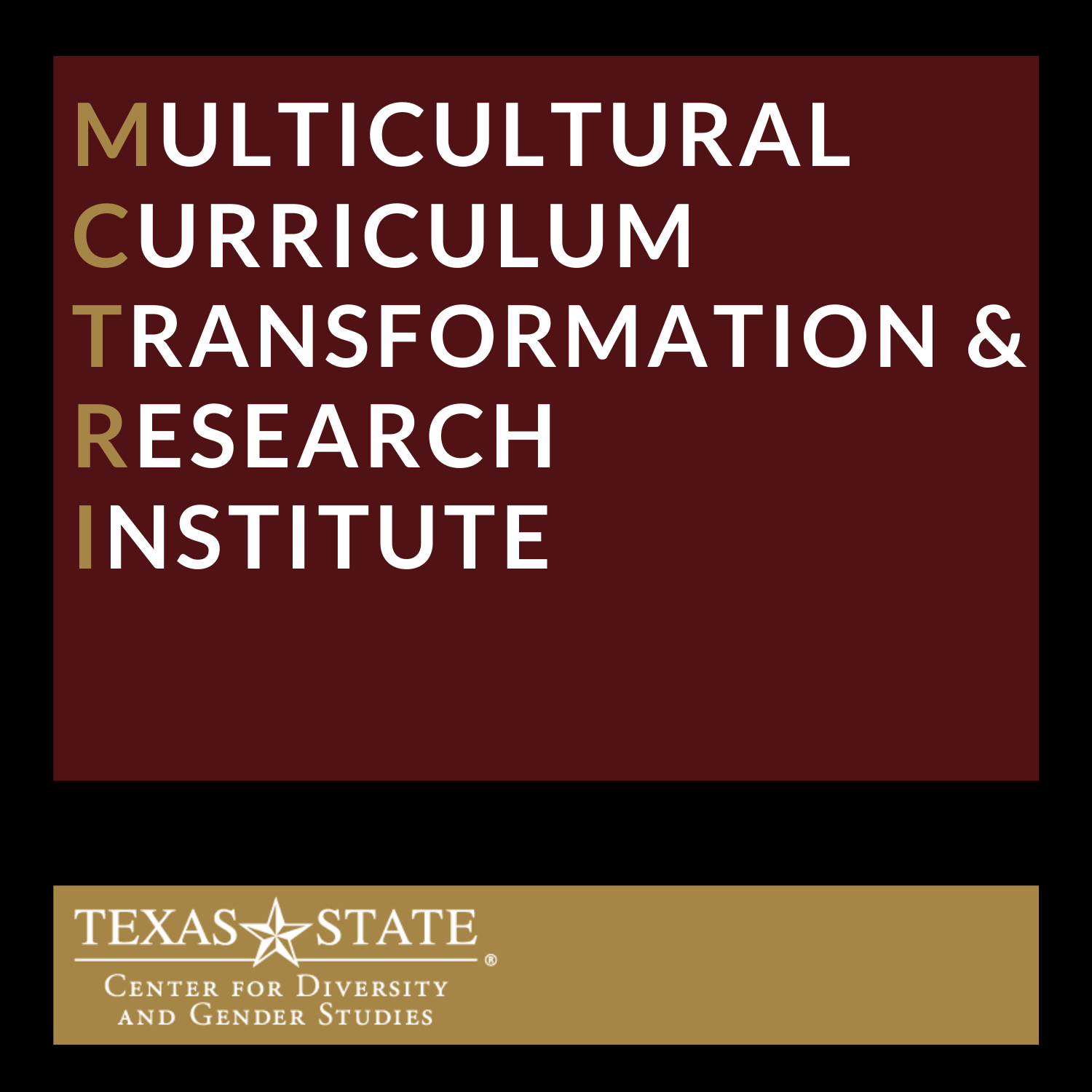Multicultural Curriculum Transformation & Research Institute

Date and Time: May 20th-24th, 2024
Place: In-Person Meetings UAC Conference Room 474
MCTRI Application (Send completed application to your Chair & Dean by March 1st. Please send signed original to UAC 478 by March 22nd).
This voluntary institute is for faculty professional development.
Texas State University’s Action Plan to Build Capacity 2017-2023
Part of Texas State University’s Action Plan to Build Capacity (2024-2027)
Goal 2: Invest in Continual Learning for Faculty, Staff, and Students
- Objective 2. Increase faculty participation in Multicultural Curriculum Transformation and Research Institute (MULT) and the number of courses taught with the MULT designation.
What does MULT/MULP mean?
Multicultural Content (MULT): Courses with 60 percent multicultural content (U.S. or International, Global Perspectives.)
Multicultural Perspective (MULP): Courses using a variety of strategies to encourage multicultural literacy, including content, inclusive instructional strategies, assessment, and classroom interactions. (When this is the only classification noted, the content is less than 60 percent).
Texas State believes that freedom of thought, innovation, and creativity are fundamental characteristics of a community of scholars. To promote such a learning environment, the university has a special responsibility to seek diversity, to instill an international perspective in it's students, and to nurture sensitivity, tolerance, and mutual respect. The promotion of the values of diversity and equal opportunity for all people through understanding of the contributions and perspectives of people of differing race, ethnicity, culture, language, religion, gender, sexual orientation, and physical abilities and disabilities. (Multicultural Curriculum Transformation in Higher Education, Eds., A. I. Morey and M. K. Kitano, 1997). In support of an increasingly diverse student body, Texas State is dedicated to increasing multiculturalism in the curriculum. Many professors have transformed their courses through the Multicultural Curriculum Transformation and Research Institute coordinated by the Center for Diversity and Gender Studies. Thus, courses are identified in the catalog and schedule of classes that offer students an opportunity to enhance their learning about multiculturalism and global perspectives
Classification System
The multicultural classification system helps Texas State track multicultural courses to determine the level at which it is providing U.S. and international perspectives issues in the curriculum. The MULT designation recognizes the significance of multicultural content and multicultural perspectives. Students benefit from multicultural content as well as perspectives.
Faculty from all colleges and departments are invited to attend the annual Multicultural Curriculum Transformation and Research Institute. The Institute is a week-long experience that focuses on enriching the curriculum by re-envisioning goals, content, teaching strategies, assessment, and classroom interactions with a multicultural lens or perspective.
-
Who is eligible?
Faculty members who wish to transform courses that have not been formally identified as having multicultural content or multicultural perspectives.
Full-time tenure track or tenured faculty and full-time lecturers are preferred, but a case can be made for other teaching faculty.
For the greatest impact, choose courses that are required for the degree program and those that impact the greatest number of students. All courses without a multicultural content or multicultural perspective designation are good candidates.
-
Professional Benefits and Stipends
Professional Benefits:
- Review best practiced teaching strategies
- Network with faculty from your discipline and other disciplines
- Improve course evaluations
- Strengthen outcome measure reporting
- Serve as a multicultural consultant in your department and college
- Research, conference presentation, and publication opportunities
- Contribute to the success of Texas State’s strategic plan for diversity goals
Stipends:
The stipends will be paid after the following activities are completed:
- Attendance: (100% or otherwise prorated), completed and approved transformed course syllabus, and completed assessment instrument: $1,200
Optional but Highly Recommended activities completed within one year of completing the Institute:
- Outcome Measures Report: response from students and 1-2 page analysis of the implemented transformation: $300
- Publish or present a research paper at a conference: up to $500*
* Not to exceed or up to $500. Faculty must have a travel application including a budget to be reimbursed for travel expenses.
-
Application Process and Deadlines
Faculty must complete the application and send it through the Chair of their department to the Dean of the college. The application must be submitted to the dean by March 1.
Once submitted, the Dean reviews applicants and recommends two faculty for participation to the Director of the Center for Diversity and Gender Studies by March 17th. If more than two in the college apply, the Dean ranks the applicants and sends all applications.
-
What topics will be covered?
- Infusing Multicultural Content and Perspectives into the Curriculum
- Infusing a Global and International Perspective into the Curriculum
- Inclusive Pedagogical Practices in the Classroom
- Infusing Diversity into the Curriculum
- Culturally Responsive Teaching
-
What happens at the institute?
The MCTRI is a compilation of activities including presentations, small group/full group of dialogue and discussions about infusing multicultural content and inclusive pedagogical practices. In addition, participants learn about course evaluation and assessment, practices. Discussions are facilitated by guest scholar(s) and a variety of Texas State faculty.
Continental breakfast, lunch, snacks and refreshments are provided.
-
What happens after the institute?
Completion certificates will be given to participants who attend all five days, turned in the multicultural course assessment instrument, and transformed syllabus. Additionally, the Director of CDGS will send letters to the Chair and Dean of the respective departments indicating completion of the Institute.
FOLLOW-UP ACTIVITIES:
- The CDGS Advisory Council will review your documents and send a recommendation for a multicultural designation of the course.
- The Director of the Center for Diversity and Gender Studies will send the Advisory Council recommendation and course documents through the Chair to the Dean for approval to officially add the multicultural designation in the schedule and/or catalog.
-
Previous Transformations by Department
-
Other Information
- Attendees need to bring the current syllabus for the proposed class for transformation to the Institute.
- Food is provided. There will be a continental breakfast, lunch, and snacks provided for the entirety of the Institute.
Testimonials
“It has been so enlightening!” --Barbara Pevoto, Ph.D.
Occupational Education Department | College of Applied Arts
I’m SO glad I had the chance to participate as I know it will make me a better teacher and gives guidance/direction to the perspectives that I’ve preached/taught/felt all of my professional life.--Kevin Jetton
Computer Information Systems and Quantitative Analysis | McCoy College of Business of Administration
“It has been one of the most useful things I have spent time on while at Texas State in terms of direct application skills as well as in its university-wide community building.”
--Emily Summers, Ph. D.
Department of Curriculum and Instruction | College of Education
“I have recommended that we send someone every year.” --Maurice Johnson, Ph.D.
Department of Health, Physical Education, and Recreation | College of Education
"It’s been quite a wonderfully challenging undertaking, full of multicultural curriculum issues day to day." --Nadine Mozon
College of Fine Arts
"I was delighted by this experience. I was able to successfully transform my syllabus, and the session I attended also let me interact with teachers from various disciplines. On any issue I was able to hear a variety of perspectives, and I came away from my session convinced there are plenty of committed teachers at Texas State." --Morris Nelms
Department of Music | College of Fine Arts & Communication
“The Institute helped to solidify my commitment to an inclusive pedagogical approach and taught me essential skills in course design, assessment and evaluation, all of which have been invaluable in strengthening my course, communicating the content more effectively, and creating a more meaningful classroom experience for both my students and me.” --Philippa Strelitz, Ph.D.
School of Health Professions | College of Health Professions
“My research interests include language issues in multicultural/multi-linguistic populations and the courses I teach have a natural tendency toward topics in this area. However, while attending the MC Institute, I found that I can infuse multiculturalism into an entire course instead of brief sections, as I have done in the past. I benefited most from the MC Institute through expanding my views on how to present information to students in the most effective ways, particularly by acknowledging and allowing for different learning styles, as well as through widening my perception of multiculturalism. The course that I transformed is essentially 100% multicultural content/perspective because of what I learned in the Institute. Many thanks for the excellent course!” --Frances Burns, Ph.D.
Department of Communication Disorders | College of Health Professions
I found the institute experience to be enjoyable and enlightening (and I was delighted to meet some people from other departments that I otherwise would never have met, most likely). --Roger Jones
College of Liberal Arts
"I was surprised how easy it was to make my courses more diverse and have continued to use many of the ideas from the institute in my teaching, including in a quantum mechanics class. Participating in the institute allowed me to see many more cultural connections in my research and teaching life." --Heather Galloway
College of Science
"Thanks for a wonderfully stimulating and fulfilling institute! Besides needing to put some serious time and energy into changing my course, I was ready to be a “student” again so I could get my creative juices flowing. The experience really helped me enhance my teaching strategies." --Carol Dochen, Ph.D
Department of SLAC | University College
"Thanks Dr. Mayo for putting together some great motivators and providing the examples that will motivate all of us to be better than we were yesterday." --Robert Ellison, MAcy
McCoy College of Business Administration
"Thanks all for a really enlightening/inspiring week.....really enjoyed the discussions." --Andrew Nance
College of Applied Arts
"It was great...to get a view of how people from other disciplines approach teaching." --Deborah Harris, Ph.D
Department of Sociology | College of Liberal Arts
"I just wanted to say thank you for such a great week at the Multicultural Curriculum Transformation and Research Institute! I had such a wonderful experience and attribute that in large part to you all." --Keila Tyner, Ph.D
College of Applied Arts
